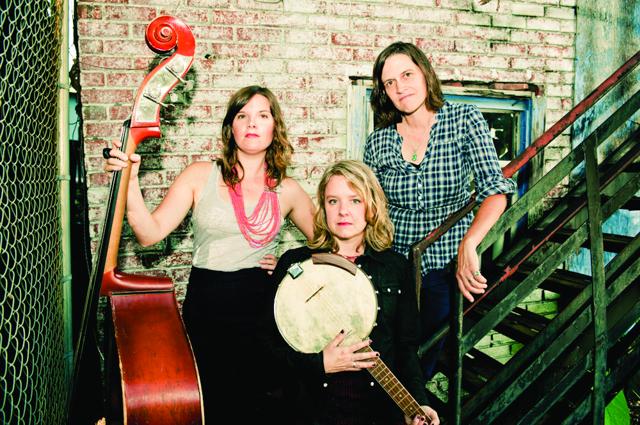On May 11, less than a week after Amendment One passed, local singer/songwriter Laura Blackley (Swayback Sisters), her partner Cindy and six others were cuffed and carted off by the Asheville Police Department. When the Register of Deeds denied them a marriage license, they refused to leave without one. It was part of an action staged by the Campaign for Southern Equality.
Before this, Blackley never thought she’d be arrested for anything. She’s an acoustic guitar player, a radio host on WNCW, a farmer and a mom — hardly your stereotypical activist radical. This morning she blends in with the Montford clientele at Tod’s Tasties. “I choose my battles,” she says, sipping coffee. Her decision to join the Campaign was a matter of looking out for her family.
“My mom had a retirement party in my hometown of 729 [people],” Blackley says. “The only place that was big enough to house the party was a local Baptist church. The emcee asked her if she’d like to introduce her family. She grabbed the microphone out of his hand and said, ‘That’s my husband, this is my mother, this is my daughter Julia, this is my daughter Laura and this is Laura’s partner, Cindy.’ I thought, if my own mother doesn’t have a problem with this, I fail to see how it’s the state’s business how I choose to live my life.”
Yet, like countless others, Blackley and her partner are denied equal parenting rights to their daughter, among the 1,137 other rights and protections granted to married couples. On May 8, during a primary for which less than 40 percent of those registered in the state cast ballots, North Carolina voters approved a constitutional amendment which disallowed not only same-sex marriage (already against the law in this state), but also domestic partnerships and civil unions. While the United States Supreme Court ruled in 1967 that marriage is indeed a civil right (Loving v. Virginia), the debate about how to apply that civil right, and to whom, continues across the country.
The Rev. Jasmine Beach-Ferrara, director of the campaign, was outside the Register of Deeds office the day Blackley and the others had their sit-in, there for moral support. She says it wasn’t the first — and probably not the last — time such an event turned out this way. “It was very powerful and moving to watch them take part in this action,” Beach-Ferrara says. “And to know the urgent reasons that motivate them to take such action — a desire to protect their family and have their family recognized as equal under the law.”
Once the cuffs had come off and they’d been set free with a pending court date, Blackley decided to channel her energy into the music. She booked a date at the Grey Eagle for July 19 when, with the Swayback Sisters, she’ll join some other friends (Lyric, Aaron “Woody” Wood, Kellin Watson, Kat Williams) to throw a benefit for the Campaign for Southern Equality. They’ve titled the evening The Love Offering. The funds raised will help others who decide to join in the struggle for equality for LGBTQ people in North Carolina.
Beach-Ferrara is looking forward to what might be stirred up by music during the Love Offering. “It’s inspiring to see people using their gifts as artists to help us build this movement together,” Beach-Ferrara says. “Music and the arts are a really powerful way to bring people together, and to reach people.”
Indeed, those arrested that day broke into song as the cops were slipping cuffs on them. Blackley recalls an impromptu round of “This Little Light of Mine.” Cathleen Johnstone, who was there for moral support, was the first arrested, so was initially separated from the others. But, she says, she’ll never forget the feeling of singing in the paddy wagon. “It was powerful,” Johnstone says. “We were separated in the wagon — they had the men on one side and the women on the other — but we could talk to each other and hear each other singing. The singing was very powerful.”
Blackley concurs, looking forward to the concert. She still looks back at how that day could have gone differently, what might have changed if she could do it over again. The answer is simple.
Their arrest “implies somehow we shouldn’t have been there, that we didn’t have a legitimate purpose,” Blackley says. “But we did have a legitimate purpose. Just because it’s not the law of the land doesn’t mean it isn’t legitimate. We would have left if they’d given us a marriage license.”
— Kim Ruehl is a freelance writer living in Asheville. Follow her on Twitter: @kimruehl.
who: Swayback Sisters, Lyric, Aaron “Woody” Wood, Kat Williams, Kellin Watson, 24-7s
what: The Love Offering: A benefit for the Campaign for Southern Equality
where: The Grey Eagle
when: Thursday, July 19 (7 p.m. Suggested $10 donation. southernequality.org and thegreyeagle.com)




Before you comment
The comments section is here to provide a platform for civil dialogue on the issues we face together as a local community. Xpress is committed to offering this platform for all voices, but when the tone of the discussion gets nasty or strays off topic, we believe many people choose not to participate. Xpress editors are determined to moderate comments to ensure a constructive interchange is maintained. All comments judged not to be in keeping with the spirit of civil discourse will be removed and repeat violators will be banned. See here for our terms of service. Thank you for being part of this effort to promote respectful discussion.